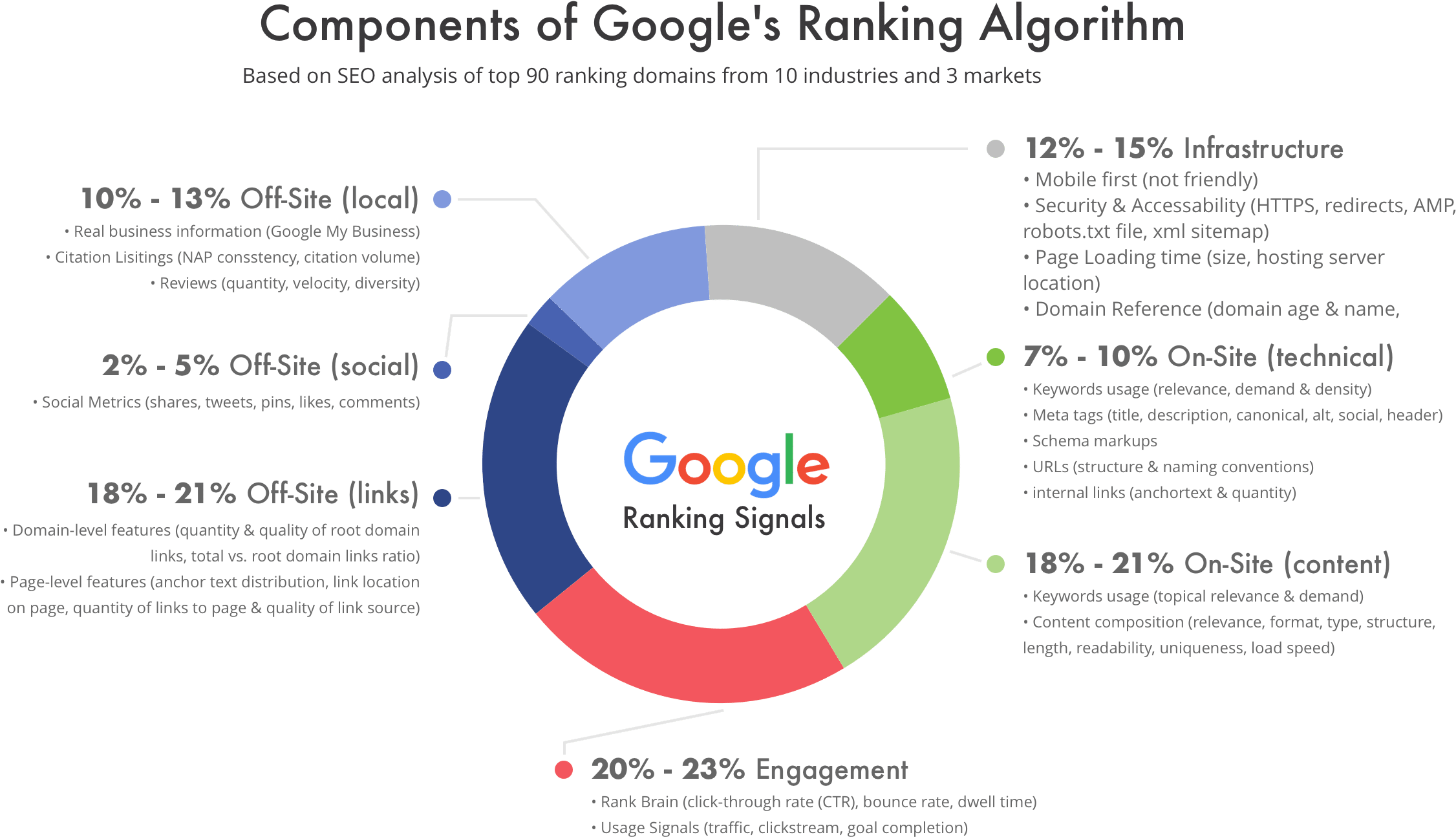
Google uses hundreds of ranking factors to determine the position of a website in its search results. While Google does not disclose the exact weight and importance of each factor, here are some key ranking factors that are known to influence search engine rankings:
- Content Quality: High-quality and relevant content that meets user intent is crucial for ranking well. Content should be informative, well-written, and offer value to users.
- Backlinks: The number and quality of backlinks pointing to a website play a significant role in its rankings. High authority and relevant backlinks from trusted sources can boost a website’s authority and visibility.
- Page Loading Speed: Google emphasizes fast-loading websites as it improves the user experience. Optimizing page speed by minimizing code, compressing images, and using caching techniques can positively impact rankings.
- Mobile-Friendliness: With the mobile-first index, Google prioritizes mobile-friendly websites. Ensuring responsive design, easy navigation, and optimized content for mobile devices is essential for better rankings.
- User Experience (UX): User signals such as bounce rate, dwell time, and click-through rate (CTR) can indirectly influence rankings. So SEO specialists suggest, Positive user experiences, intuitive navigation, and engaging design contribute to better rankings.
- On-Page Optimization: Optimizing title tags, meta descriptions, headers, and using relevant keywords in content helps search engines understand the context and relevance of a webpage.
- Domain Authority: The overall authority and trustworthiness of a domain can impact rankings. Factors such as domain age, history, and the presence of high-quality content and backlinks contribute to domain authority.
- Security (HTTPS): Websites with HTTPS encryption are favored by Google. Ensuring a secure connection and protecting user data is an important ranking factor.
- Social Signals: While not a direct ranking factor, social signals (such as likes, shares, and comments) can indirectly impact visibility and brand awareness, leading to increased organic traffic.
- User Intent: Google aims to understand user intent and provide the most relevant results. Creating content that aligns with user search intent and satisfies their queries improves their chances of ranking well.
- Click-Through Rate (CTR): The percentage of users who click on a website’s listing in search results can impact rankings. A higher CTR suggests that the listing is relevant and appealing to users.
- Dwell Time: The amount of time users spend on a webpage after clicking on a search result can indicate its relevance and quality. Longer dwell times can positively influence rankings.
- Website Architecture: A well-organized and easily navigable website structure helps search engines crawl and understand the content. Logical hierarchy, clear URLs, and a sitemap contribute to better rankings.
- Domain Factors: Factors related to the domain name itself, such as keyword relevance, length, and the presence of hyphens, can impact rankings. However, they carry less weight compared to other factors.
- Page-Level Social Signals: The social engagement (likes, shares, comments) specific to a webpage can indirectly influence rankings. Popular content tends to attract more visibility and organic traffic.
- Website Usability: User-friendly websites that offer a seamless browsing experience, easy accessibility, and clear calls to action are favored by search engines and users alike.
- Content Freshness: Regularly updating and adding new content signals to search engines that the website is active and relevant. Fresh content can boost rankings, particularly for topics that require up-to-date information.
- Image Optimization: Optimizing images with descriptive file names, alt tags, and compressing them for faster loading can enhance user experience and improve rankings in image search results.
- Local SEO Factors: For businesses targeting local audiences, factors such as NAP (name, address, phone number) consistency, local citations, and positive reviews impact rankings in local search results.
- Schema Markup: Using structured data markup, such as schema.org tags, helps search engines understand and display content more effectively, potentially leading to enhanced visibility and rich snippets in search results.
According to an SEO Expert in Dubai, It’s important to note that this is not an exhaustive list, and the relative importance of ranking factors can change over time as Google updates its algorithms. It’s recommended to follow best practices, create high-quality content, and focus on providing a great user experience to improve your chances of ranking well in search results.

